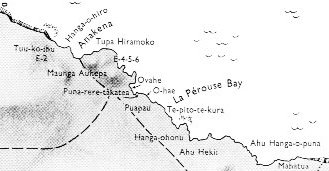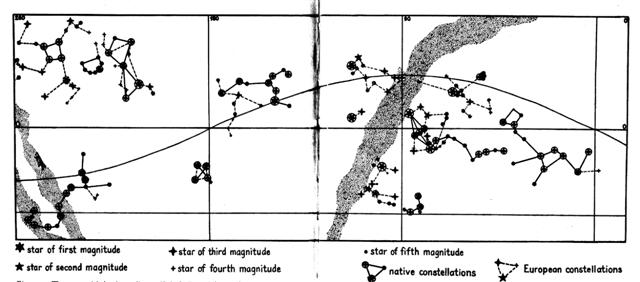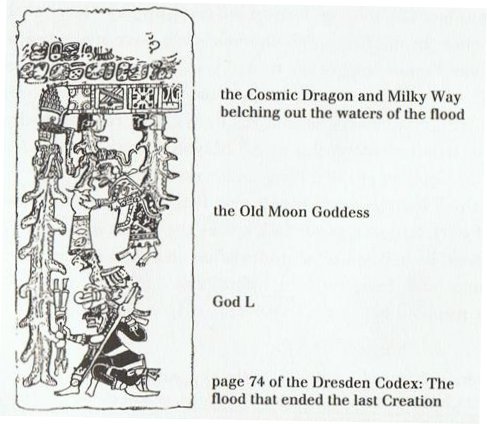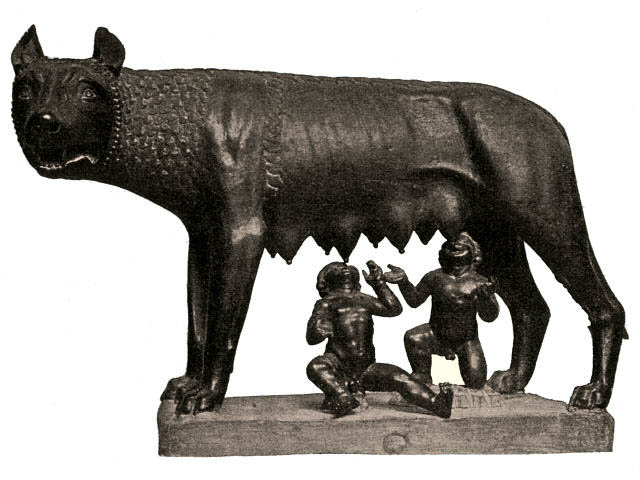315. There was also a cave into which they carried the severely broken body of Kuukuu, we remember, and this place was not the Bay of Turtles (Hanga Hoonu) but the plain of Oromanga. And the glyph line was number 4 (→ death):
... They all sat down and rested [on the plain of Oromanga], when suddenly they saw that a turtle had reached the shore and had crawled up on the beach. He [Ira] looked at it and said, 'Hey, you! The turtle has come on land!' He said, 'Let's go! Let's go back to the shore.' They all went to pick up the turtle. Ira was the first one to try to lift the turtle - but she didn't move. Then Raparenga said, 'You do not have the necessary ability. Get out of my way so that I can have a try!' Raparenga stepped up and tried to lift the turtle - but Raparenga could not move her. Now you spoke, Kuukuu: 'You don't have the necessary ability, but I shall move this turtle. Get out of my way!' Kuukuu stepped up, picked up the turtle, using all his strength. After he had lifted the turtle a little bit, he pushed her up farther. No sooner had he pushed her up and lifted her completely off the ground when she struck Kuukuu with one fin. She struck downward and broke Kuukuu's spine.The turtle got up, went back into the (sea) water, and swam away. All the kinsmen spoke to you (i.e. Kuukuu): 'Even you did not prevail against the turtle!'
They put the injured Kuukuu on a stretcher and carried him inland. They prepared a soft bed for him in the cave and let him rest there. They stayed there, rested, and lamented the severely injured Kuukuu. Kuukuu said, 'Promise me, my friends, that you will not abandon me!' They all replied, 'We could never abandon you!' They stayed there twenty-seven days in Oromanga. Everytime Kuukuu asked, 'Where are you, friends?' they immediately replied in one voice, 'Here we are!' They all sat down and thought. They had an idea and Ira spoke, 'Hey, you! Bring the round stones (from the shore) and pile them into six heaps of stones!' One of the youths said to Ira, 'Why do we want heaps of stone?' Ira replied, 'So that we can all ask the stones to do something.' They took (the material) for the stone heaps (pipi horeko) and piled up six heaps of stone at the outer edge of the cave. Then they all said to the stone heaps, 'Whenever he calls, whenever he calls for us, let your voices rush (to him) instead of the six (of us) (i.e., the six stone heaps are supposed to be substitutes for the youths). They all drew back to profit (from the deception) (? ki honui) and listened. A short while later, Kuukuu called. As soon as he had asked, 'Where are you?' the voices of the stone heaps replied, 'Here we are!' All (the youths) said, 'Hey, you! That was well done!' ...
I have guessed place names on Easter Island were iterated in Manuscripte E at their correct positions as determined by the Full Moon - whose face was reflecting the positions of the Sun half a year away (i.e. among the heliacal stars):
|
NAKSHATRA DATES: |
|
5 |
HANGA HOONU |
DEC 26 (360) - 30 (364) |
|
27 |
OROMANGA |
DEC 31 (365) - JAN 26 (391) |
|
5 |
PAPA O PEA |
JAN 27 (392) - 31 (396) |
| JUNE 28 |
29 (180) |
SIRIUS |
JULY 1 (*102) |
13 |
 |
 |
 |
 |
| (100) Ga4-16 |
Ga4-17 (100) |
Ga4-18 |
Ga4-19 |
| ν Hydrae (163.1) |
no star listed (164)
ALTAIR (α Aquilae)
|
Wings-27 (Snake)
η Oct. (165.4), ALKES (Shallow Basin) = α Crateris (165.6) |
ANA-TIPU-4 (Upper-side-pillar - where the guards stood)
MERAK (Loin) = β Ursae Majoris (166.2), DUBHE (Bear) = α Ursae Majoris (166.7) |
| Aug 31 |
Sept 1 |
2 (*165) |
3 (246) |
| °Aug 27 |
28 |
29 (*161) |
30 (242) |
| 'Aug 4 (216) |
5 (*137) |
6 |
7 |
| "July 21 |
22 / 7 → π |
Anakena 23 (204) |
24 (*125) |
|
... Everywhere the dream soul looked around for a residence for the king. The dream soul went to Maunga Teatea and gave him the name Maunga Teatea A Hau Maka O Hiva. The dream soul of Hau Maka looked around. From Maunga Teatea she looked to Rangi Meamea (i.e., Ovahe).

The dream soul spoke the following: There it is - ho! - the place - ho! - for the king - ho! - to live (there in the future), for this is (indeed) Rangi Meamea ...
... The Explorers arrived at Rangi Meamea in "July 23 (Anakena 23) and there they stayed on the beautiful beach of Oromanga for 27 days ...
... When Hotu's canoe had reached Taharoa, the vaginal fluid (of Hotu's pregnant wife) appeared. They sailed towards Hanga Hoonu [Bay of Turtles], where the mucus (kovare seems to refer to the amniotic sac in this case) appeared. They sailed on and came to Rangi Meamea, where the amniotic fluid ran out and the conctractions began. They anchored the canoe in the front part of the bay, in Hanga Rau. The canoe of Ava Rei Pua also arrived and anchoraged. After Hotu's canoe had anchoraged, the child of Vakai and Hotu appeared. It was Tuu Maheke, son of Hotu, a boy. After the canoe of Ava Rei Pua had also arrived and anchoraged, the child of Ava Rei Pua was born. It was a girl named Ava Rei Pua Poki ... |
| CLOSE TO THE FULL MOON: |
| DEC 28 |
29 |
30 (364) |
31 (*285) |
| HANGA HOONU |
OROMANGA |
| ι Cephei (346.0), λ Aquarii, γ Piscis Austrini, σ Pegasi (346.5) |
SCHEAT AQUARII = δ Aquarii (347.0), ρ Pegasi (347.2), δ Piscis Austrini (347.4), FOMALHAUT (Mouth of the Fish) = α Piscis Austrini, τ Gruis (347.8) *306 = *347.4 - *41.4 |
FUM AL SAMAKAH (Mouth of the Fish) = β Piscium (348.3), ζ Gruis (348.5), ο Andromedae (348.9) |
Al Fargh al Mukdim-24 (Fore Spout) / Purva Bhādrapadā-26 (First of the Blessed Feet) / House-13 (Pig) SCHEAT PEGASI = β Pegasi, π Piscis Austrini (349.3), κ Gruis (349.4), MARKAB PEGASI = α Pegasi (349.5)
*308 = *349.4 - *41.4 |
| March 2 |
3 |
4 (*348) |
5 (64) |
| °Febr 26 |
27 |
28 (*344) |
°March 1 (60) |
| 'Febr 3 |
4 |
5 (36) |
6 (*322) |
| "Jan 20 |
Tua Haro 21 |
22 |
23 (*308) |
| JULY 15 |
16 |
17 (*118 = 4 * 29½) |
18 (199) |
7 |
 |
 |
 |
 |
| Ga5-6 (100 + 16) |
Ga5-7 |
Ga5-8 (118 = 472 / 4) |
Ga5-9 |
| no star listed (180) |
π Virginis (181.0), θ Crucis (181.5) |
12h (182.6)
ο Virginis (182.1), η Crucis (182.5) |
ALCHITA (The Couthern Tent) = α Corvi, MA WEI (Tail of the Horse) = δ Centauri (183.1), MINKAR (Beak) = ε Corvi (183.7), ρ Centauri (183.9) |
| Sept 17 (260 = 80 + 180) |
18 (*181) |
19 |
20 |
| °Sept 13 |
14 (*177 = *354 / 2) |
15 |
16 |
| 'Aug 21 |
22 (*154 = *140 + *14) |
23 |
24 (236 = 472 / 2) |
| "Aug 7 |
8 (*140 = *181 - *41) |
Hora Iti 9 |
10 (222 = 236 - 14) |
 |
| CLOSE TO THE FULL MOON: |
| JAN 14 |
15 (380) |
(*301 = *118 + *183) |
17 |
| OROMANGA |
| η Tucanae (363.0), ψ Pegasi (363.1), 32 Piscium (363.2), π Phoenicis (363.4), ε Tucanae (363.6), τ Phoenicis (363.9) |
θ Oct. (364.4) |
Al Fargh al Thāni-25 (Rear Spout)
0h (365.25)
CAPH (Hand) = β Cassiopeiae, SIRRAH (Navel of the Horse) = α Andromedae (0.5), ε Phoenicis, γ³ Oct. (0.8) |
Uttara Bhādrapadā-27 (2nd of the Blessed Feet) / Wall-14 (Porcupine)
ο Oct. (1.3), ALGENIB PEGASI = γ Pegasi (1.8) |
| March 19 (78) |
20 |
EQUINOX |
22 (*366) |
| °March 15 |
16 (*360) |
17 |
18 (77) |
| 'Febr 20 (*336) |
21 |
22 (53) |
TERMINALIA |
| "Febr 6 |
Tehetu'upú 7 (403) |
8 (*324) |
9 (40) |
 |
| JULY 19 (200) |
20 (*121 = *185 - *64) |
 |
 |
| Ga5-10 (120) |
Ga5-11 |
| PÁLIDA (Pale) = δ Crucis (184.6), MEGREZ (Root of the Tail) = δ Ursae Majoris (184.9) |
Hasta-13 (Hand) / Chariot-28 (Worm)
GIENAH (Wing) = γ Corvi (185.1), ε Muscae (185.2), ζ Crucis (185.4), ZANIAH (Corner) = η Virginis (185.9) |
| Sept 21 (*184) |
EQUINOX |
| °Sept 17 (*180) |
18 (261) |
| 'Aug 25 (*157) |
26 (238) |
| "Aug 11 (*143) |
Hora Iti 12 (224) |
| CLOSE TO THE FULL MOON: |
| JAN 18 |
19 (384) |
|
OROMANGA |
| χ Pegasi (2.1), θ Andromedae (2.7) |
σ Andromedae (3.0), ι Ceti (3.3), ζ Tucanae (3.5), ρ Andromedae, π Tucanae (3.7) |
| March 23 (82) |
24 (*368) |
| °March 19 (78) |
20 (*364) |
| 'Febr 24 (55) |
25 (*341) |
| "Febr 10 (41) |
Tehetu'upú 11 (*327) |
| JULY 21 |
7-22 (*123) |
23 |
24 |
25 (206) |
 |
 |
 |
 |
 |
| Ga5-12 |
Ga5-13 (123) |
Ga5-14 |
Ga5-15 |
Ga5-16 |
| CHANG SHA (Long Sand-bank) = ζ Corvi (186.3) |
INTROMETIDA (Inserted) = ε Crucis (187.4), ACRUX = α Crucis (187.5) |
γ Com. Berenicis (188.0), σ Centauri (188.1), ALGORAB = δ Corvi (188.5), GACRUX = γ Crucis (188.7) |
γ Muscae (189.0), AVIS SATYRA (Bird of the Satyrs) = η Corvi (189.3), ASTERION (Starry) = β Canum Ven. (189.5), KRAZ = β Corvi, κ Draconis (189.7) |
α Muscae (190.2), τ Centauri (190.5), χ Virginis (190.7)
ALDERAMIN (α Cephei)
|
| Sept 23 |
24 (*187) |
25 (268) |
26 |
27 |
| °Sept 19 |
20 (*183) |
21 (264) |
EQUINOX |
23 |
| 'Aug 27 |
28 (240) |
29 (*161) |
30 |
31 |
| "Aug 13 |
14 (*146) |
Hora Iti 15 (227) |
16 |
17 |

... After the great flood had at long last receded, Raven had gorged himself on the delicacies left by the receding water, so for once, perhaps the first time in his life, he wasn't hungry. But his other appetites, his curiosity and the unquenchable itch to meddle and provoke things, to play tricks on the world and its creatures, these remained unsatisfied. Raven gazed up and down the beach. It was pretty, but lifeless. There was no one about to upset, or play tricks upon. Raven sighed. He crossed his wings behind him and strutted up and down the sand, his shiny head cocked, his sharp eyes and ears alert for any unusual sight or sound. The mountains and the sea, the sky now ablaze with the sun by day and the moon and stars he had placed there, it was all pretty, but lifeless. Finally Raven cried out to the empty sky with a loud exasperated cry. And before the echoes of his cry faded from the shore, he heard a muffled squeak. He looked up and down the beach for its source and saw nothing. He strutted back and and forth, once, twice, three times and still saw nothing. Then he spied a flash of white in the sand. There, half buried in the sand was a giant clamshell. As his shadow fell upon it, he heard another muffled squeak. Peering down into the opening between the halves of the shell, he saw it was full of tiny creatures, cowering in fear at his shadow ... |
| CLOSE TO THE FULL MOON: |
| JAN 20 |
21 (*306) |
22 |
23 (388) |
24 |
|
OROMANGA |
| no star listed (4) |
ANKAA = α Phoenicis, κ Phoenicis (5.0)
ALPHARD (α Hydrae)
|
λ Phoenicis (6.3), β Tucanae (6.4) |
ANDROMEDA GALAXY (M31), π Andromedae (7.7) |
ε Andromedae (8.2), DELTA = δ Andromedae (8.4), SCHEDIR (Breast) = α Cassiopeiae (8.6), ζ Andromedae, μ Phoenicis (8.9) |
| March 25 (84) |
26 |
27 |
28 (*372) |
29 (*8) |
| 0h |
°March 22 |
23 |
24 (*368) |
25 (*4) |
| 'Febr 26 |
27 |
28 (59) |
'March 1 |
2 (*346) |
| "Febr 12 |
13 (*329) |
2-14 (45) |
15 |
Tehetu'upú 16 |
| JULY 26 |
27 |
28 |
29 (210) |
30 (*131) |
 |
 |
 |
 |
 |
| Ga5-17 |
Ga5-18 (128) |
Ga5-19 |
Ga5-20 |
Ga5-21 |
|
Al Áwwā'-11 (The Barker) / Shur-mahrū-shirū-18 (Front or West Shur)
Sombrero Galaxy = M104 Virginis (191.1), ρ Virginis (191.4), PORRIMA = γ Virginis, γ Centauri (191.5) |
ι Crucis (192.2), β Muscae (192.5), MIMOSA = β Crucis (192.9) |
no star listed (193) |
κ Crucis (194.4), ψ Virginis (194.5), μ Crucis, λ Crucis (194.6), ALIOTH (Fat Tail) = ε Ursae Majoris, ι Oct. (194.8) |
MINELAUVA = δ Virginis (195.1), COR CAROLI = α Canum Ven. (195.3) |
| Sept 28 |
29 (*192) |
30 (273) |
Oct 1 |
2 |
| °Sept 24 |
25 (*188) |
26 |
27 (270) |
28 |
| 'Sept 1 |
2 (*165) |
3 |
4 |
5 (248) |
| "Aug 18 (*150) |
19 (231) |
20 |
Hora Iti 21 |
22 |
| CLOSE TO THE FULL MOON: |
| JAN 25 |
26 |
27 (392) |
28 |
29 (*314) |
| OROMANGA |
PAPA O PEA |
|
... He (i.e., Ira) said, 'Let's go! We shall go to Papa O Pea'. They all got up and moved on. On the twentieth day of the month of August ('Hora Iti') they went to Papa O Pea. They all went and came to Papa O Pea, looked around in Papa O Pea, and gave the name 'Papa O Pea A Hau Maka'. They stayed five days in Papa O Pea ...
Pea. (Also peapea): To go away with bits of food or mud sticking to one's face or garments. Vanaga. Peaha, perhaps ... maybe, chance, doubtful; reoreo peaha ... Ma.: pea, perhaps. Peapea, an erasure ... hakapeapea ... Peau, to sweep all away. Ma.: peau, to be turned away. Churchill. Peau, a wave (Sa., To., Fu., Fotuna, Niuē, Mq., Nuguria); Mgv.: peau, peahu, id. Churchill 2.
... But in the fullness of time an obscure instinct led the eldest of them towards the anthill which had been occupied by the Nummo. He wore on his head a head-dress and to protect him from the sun, the wooden bowl he used for his food. He put his two feet into the opening of the anthill, that is of the earth's womb, and sank in slowly as if for a parturition a tergo. The whole of him thus entered into the earth, and his head itself disappeared. But he left on the ground, as evidence of his passage into that world, the bowl which had caught on the edges of the opening. All that remained on the anthill was the round wooden bowl, still bearing traces of the food and the finger-prints of its vanished owner, symbol of his body and of his human nature, as, in the animal world, is the skin which a reptile has shed ... |
| ξ Phoenicis (9.0), ρ Tucanae (9.1), DENEB KAITOS (Tail of the Sea Beast) = β Ceti, η Phoenicis (9.4), AL NITHĀM (String of Pearls) = φ¹ Ceti (9.6) |
ACHIRD (Woman with Luminous Rays) = η Cassiopeiae (10.7) |
Legs-15 (Wolf)
ν Andromedae (11.0), φ² Ceti (11.1), ρ Phoenicis (11.2), η Andromedae (11.4) |
CIH (Whip) = γ Cassiopeiae, λ Tucanae (12.4), φ³ Ceti (12.6), μ Andromedae (12.8) *12.4 + *365 -*41.4 = *336 (= 4 * 84) |
φ4 Ceti (13.2) |
| March 30 |
31 (*375) |
April 1 (91) |
2 |
3 |
| °March 26 |
27 |
28 (*372) |
29 (88) |
30 |
| 'March 3 |
4 |
5 (64) |
6 (*350) |
7 |
| "Febr 17 |
18 |
19 (50) |
20 (*336) |
Tehetu'upú 21 |
 |
| JULY 31 |
AUG 1 |
2 (214) |
3 (*500) |
4 (*136) |
5 |
6 |
 |
 |
 |
 |
 |
 |
 |
| Ga5-22 |
Ga5-23 |
Ga5-24 |
Ga5-25 (135) |
Ga5-26 |
Ga5-27 (→ 364) |
Ga5-28 |
| δ Muscae (196.5) , VINDEMIATRIX (Grape Gatherer) = ε Virginis (196.8) |
13h (197.8)
ξ¹ Centauri (197.1), ξ² Centauri (197.9) |
APAMI-ATSA (Child of Waters) = θ Virginis, ψ Hydrae (198.5), DIADEM = α Com. Ber. (198.9) |
AL DAFĪRAH (Tuft) = β Com. Ber. (199.4) |
σ Virginis (200.4) |
γ Hydrae (201.0), ι Centauri (201.4) |
Al Simāk-12 (Lofty) / Chitra-14 (Bright One) / Horn-1 (Crocodile) / Sa-Sha-Shirū-20 (Virgin's Girdle) / ANA-ROTO-3 (Middle pillar)
MIZAR = ζ Ursae Majoris (202.4), SPICA = α Virginis, ALCOR = 80 Ursae Majoris (202.7)
SADALMELIK (α Aquarii)
*161 = *202.4 - 41.4 |
| Oct 3 |
4 |
5 |
6 |
7 (*200) |
8 |
9 (282) |
| °Sept 30 |
°Oct 1 |
2 |
3 (275) |
4 (*196) |
5 |
6 |
| 'Sept 6 |
7 (250) |
8 |
9 |
10 |
11 |
12 (*175) |
| "Aug 23 |
24 (236) |
25 |
Hora Iti 26 |
27 |
28 |
Hora Iti 29 |
|
Ahu. 1. Funerary monument with niches holding the skeletons of the dead. 2. Generic term for a grave, a tomb merely enclosed with stones. 3. Stone platform, with or without graves. 4. Elevated seat, throne. 5. Swollen; to swell up: ku-ahu-á tooku va'e, my foot is swollen; ananake te raá e-tagi-era te ûka riva mo toona matu'a ka-ahu ahu-ró te mata, every day the daughter cried for her parents until her eyes were quite swollen. Vanaga.
1. To transfer, to transplant, to take up by the roots. 2. To puff up, to swell, a swelling, protuberance; gutu ahu, swollen lips; ahuahu, to swell, plump, elephantiasis, dropsy; ahuahu pupuhi, amplitude; manava ahuahu, indigestion. 3. Paralysis. 4. A carved god of dancing, brought forth only on rare occasions and held of great potency. Ahuahu, inflammation. Ahukarukaru (ahu 2 - karukaru), dropsy. Churchill. |
Ahu Akapu
(2 days) |
Aka. 1. Anchor: he-hoa te aka, to drop anchor. 2. Root of certain plants (banana tree, taro, sugar-cane). 3. To be paralyzed by surprise. Vanaga.
1. Root; aka totoro, to take root. P Pau., Mq.: aka, root. Ta.: aa, id. 2. (āka) anchor. 3. Causative (haka). Churchill. |
Pu Pakakina
(1 month) |
| CLOSE TO THE FULL MOON: |
| JAN 30 |
31 (396) |
FEBR 1 |
2 |
3 |
4 (*320) |
5 (36) |
|
PAPA O PEA |
... On the twenty-sixth day of the month of August ('Hora Iti') they went from Papa O Pea to Ahu Akapu. They all went and reached Ahu Akapu. They looked around and gave the name 'Ahu Akapu A Hau Maka'. They also saw (all of) Te Pito O Te Kainga, looked around, and gave (the whole island) the name 'Te Pito O Te Kainga A Hau Maka'. [E:31] They made camp and rested at Ahu Akapu for two days. On the twenty-ninth day of the month of August ('Hora Iti') they went to Pu Pakakina. They arrived, remained there, and gave the name 'Pu Pakakina A Ira'. They remained one month in Pu Pakakina. |
| no star listed (14) |
1h (15.2)
β Phoenicis (15.1), υ Phoenicis, ι Tu canae (15.6), η Ceti, ζ Phoenicis (15.7) |
Al Batn Al Hūt-26 (Belly of the Fish) / Revati-28 (Prosperous) / 1-iku (Field Measure)
MIRACH (Girdle) = β Andromedae, KEUN MAN MUN (Camp's South Gate) = φ Andromedae (16.0), ANUNITUM = τ Piscium (16.5), REVATI (Abundant) = ζ Piscium (16.9)
REGULUS (α Leonis)
|
ν Phoenicis (17.4), κ Tucanae (17.6) |
no star listed (18) |
ADHIL (Garment's Train) = ξ Andromedae (19.3), θ Ceti (19.7) |
KSORA (Knee) = δ Cassiopeiae (20.1), ω Andromedae (20.6), γ Phoenicis (20.8) |
| April 4 |
5 (460 = 396 + 64) |
6 |
7 |
8 (13 * 29½ - ½) |
9 (*384) |
10 (100) |
| °March 31 |
°April 1 (91) |
2 (*377) |
3 |
4 |
5 (460 = 396 + 64) |
6 (*16) |
| 'March 8 |
9 |
10 (*354) |
11 |
12 |
13 (72) |
3-14 |
| Tehetu'upú 22 |
TERMINALIA |
"Febr 24 (420) |
25 |
26 |
27 (*7 * 7 * 7) |
28 (59) |
|
... The leap day was introduced as part of the Julian reform. The day following the Terminalia (February 23) was doubled, forming the bis sextum - literally 'double sixth', since February 24 was 'the sixth day before the Kalends of March' using Roman inclusive counting (March 1 was the 'first day'). Although exceptions exist, the first day of the bis sextum (February 24) was usually regarded as the intercalated or 'bissextile' day since the third century. February 29 came to be regarded as the leap day when the Roman system of numbering days was replaced by sequential numbering in the late Middle Ages ... |
The whole island was due for visitation before the Explorers went to Pu Pakakina. Ahu Akapu was not far north of Hanga Roa but we will look in vain for Pu Pakakina:
| 0. Nga Kope Ririva Tutuu Vai A Taanga |
| 1. PU MAHORE |
Poko Uri |
Te Manavai |
Te Kioe Uri |
Te Piringa Aniva |
Te Pei |
Te Pou |
Hua Reva |
| Akahanga |
10. Hatinga Te Kohe |
Roto Ire Are |
Tama |
One Tea |
HANGA TAKAURE |
Poike |
16. PUA KATIKI |
| Maunga Teatea |
Mahatua |
Taharoa |
HANGA HOONU |
| RANGI MEAMEA |
Peke Tau O Hiti |
OROMANGA |
Maunga Hau Epa |
HANGA MORIA ONE |
.jpg)
|


















.jpg)